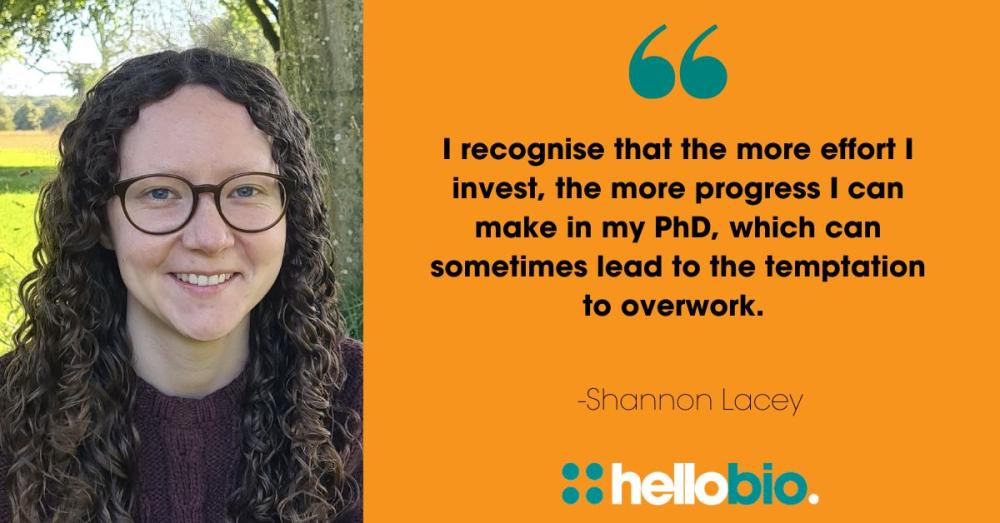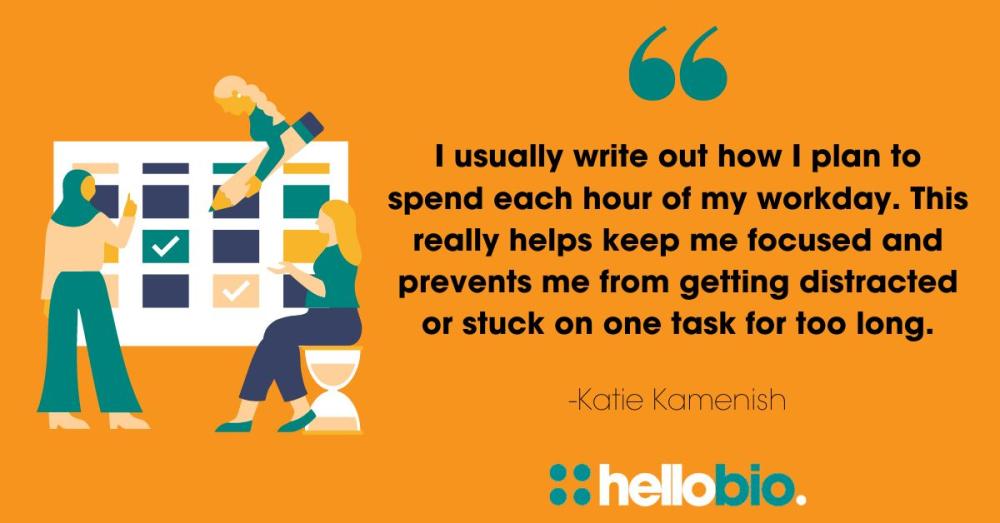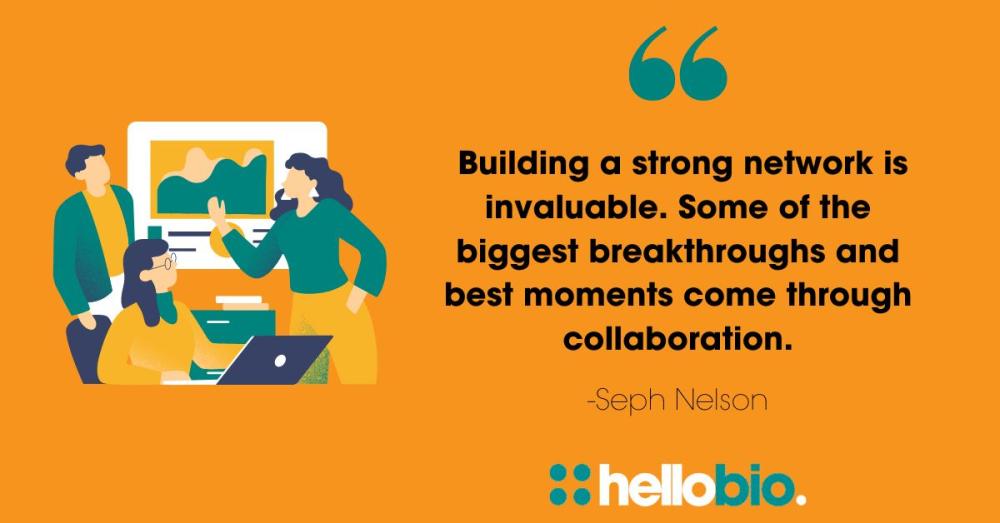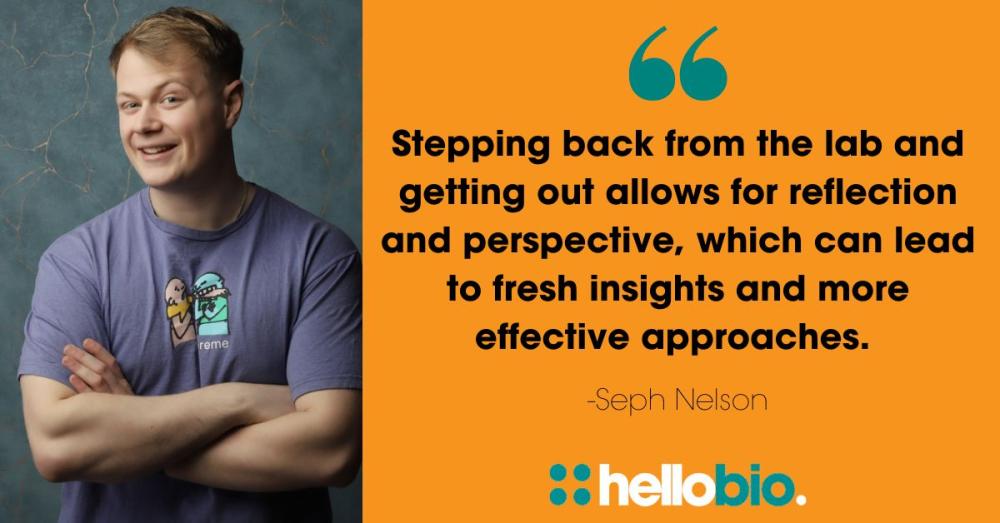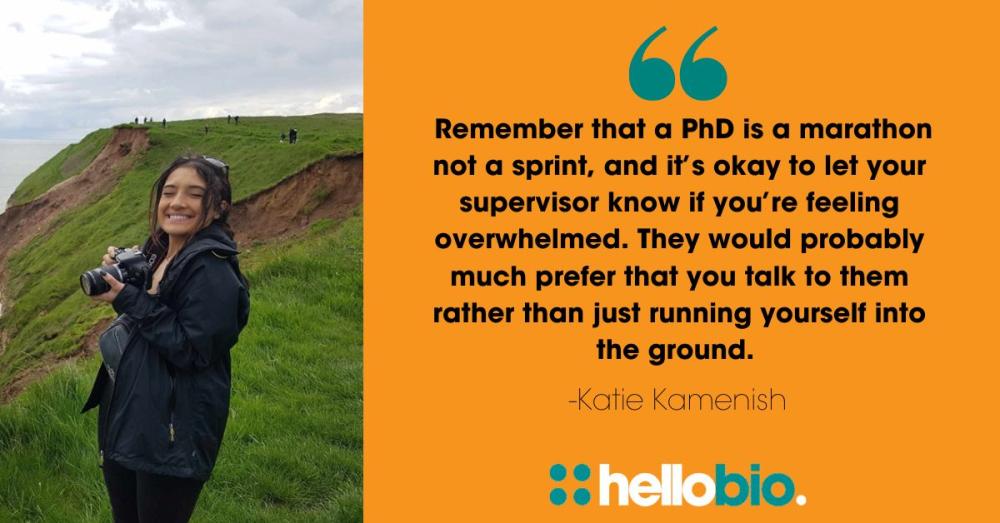Tips for Surviving the First Week of Your PhD
Starting a PhD can be daunting. You may be feeling a mixture of excitement and nerves as you begin the next 4+ years of your life. For some, it may feel like a continuation of their degree, and you may have already worked with the same supervisor in the same lab that you're joining. However, for others, starting a PhD can involve moving cities or even countries which can come with its own unique challenges. It might feel quite different to your degree as you'll have more independence in what you do.
We got in touch with three PhD students based in the UK; Seph Nelson, Katie Kamenish and Shannon Lacey, to learn about their experience of starting a PhD, and they shared their top tips for making it through that all-important first week!
- Seph Nelson is a second year PhD student at the University of Bath, UK. His research focuses on investigating the anxiolytic and antidepressant potential of prolonged-release injectable buprenorphine.
- Katie Kamenish is a first year PhD student at the University of Bristol, UK. Her research explores the behavioural and neurobiological mechanisms underlying the emotionally reinforcing effects of analgesic opioid ligands.
- Shannon Lacey is a first year PhD student at the University of Bristol, UK. Her project investigates the relationship between circadian rhythms and cognition in aging.
How were you feeling before you started your PhD?
Seph: Excited mainly! I have always wanted to do a PhD, for as long as I can remember, so it felt like the culmination of years of hard work which added (slightly!) to the nerves.
Katie: I was so excited! I had worked as a research technician for one of my supervisors prior to starting my PhD, so I was already really comfortable with my environment and the people I’d be working with.
Shannon: I felt very lucky to get a place on my Doctorial Training Partnership (DTP)(GW4 BioMed MRC) because I know how competitive funded positions are becoming. I was working as a technician at the time and was surrounded by other people’s research, so it was exciting to know that I now had 4 years to delve into my own project. At the same time, I knew that it was going to be a massive commitment and so there was of course some apprehension and nervousness about the sacrifices that a PhD would potentially bring.
What did your first week involve?
Seph: My first week involved a lot of introductory activities, including health and safety sessions and various orientation talks, mixed in with other new PhD students from across the entire Department of Life Sciences. I was very fortunate to already be familiar with the lab and supervisors before beginning my PhD. Having completed my master's project in the same lab, I was able to start the research from day one, making the transition smooth and seamless which definitely helped the nerves!
Katie: I don’t think I had a ‘typical’ first week compared to most PhD students. Since I was staying in the same lab, I had ample time to talk to my supervisors and get things ready so I could start running experiments as soon as possible. My first experiment involved a behavioural task I was very familiar with, so my first week actually felt very in line with my pre-PhD routine. I think that also calmed any potential nerves I might’ve had about starting a new project.
Shannon: As part of my DTP, I had a 3-month prep period, so I didn’t get involved with my own research right away. I did however shadow other people in the lab with some of their own experiments. Much of my first week was spent just trying to get to know people and understand the work that was already going on in the lab, meeting my supervisors and doing some background reading.
What does a typical day look like for you now?
Seph: I wouldn’t say there is such a thing as a typical day! My research is very multidisciplinary, using a variety of different techniques. Some days I am in a dark room imaging fluorescent brains, others I am running behavioral studies. It keeps me on my toes, ensuring that no two days are ever the same.
Katie: My project predominantly involves behavioural experiments, so I spend the majority of my time on the animal unit rather than in a lab or office. Once I’m finished running experiments for the day, I normally use my afternoons for data management and staying on top of writing or reading papers. If I have spare time, I always try to observe any interesting techniques or procedures I may want to use for future experiments.
Shannon: I don’t really know if I have a typical day. Some periods are more lab-heavy and I'll spend most of my time in the lab, while other days are just desk-based and can involve either analysing, reading literature, writing-up or planning experiments. And some days it’s a mixture of both!
How has the PhD workload compared to your degree?
Seph: It is roughly comparable. The benefit of a PhD is that you are doing it all for yourself; your work has true meaning and impact. While the workload can be intense, the motivation comes from knowing that I am contributing to a field I am passionate about. The level of independence makes the effort incredibly rewarding, allowing you to plan your approach and further explore interesting questions your research produces. It suits who I am much more than an undergraduate degree!
Katie: I’ve found the workload of my PhD project to be a lot more manageable compared to my undergraduate programme. I attended a liberal arts college in the United States, and the intensive courseload demanded pretty much all of my free time. Although the PhD is still a lot of work, I think having the freedom to set my own schedule makes things easier even if the amount of work is relatively the same, and I also think having ownership over the project makes the workload more enjoyable overall.
Shannon: Overall, I find the workload to be similar, perhaps with a tendency to come in waves of busier periods. The main difference I've experienced is having some control over when these busy periods occur, depending on what I commit myself to. At the same time, I recognise that the more effort I invest, the more progress I can make in my PhD, which can sometimes lead to the temptation to overwork.
What support is available to you as a PhD student?
Seph: I am very lucky here at the University of Bath that I have such a strong support network. All my supervisors are very invested and helpful, supporting me both personally and professionally. I am very fortunate to be in a social and friendly communal office, which definitely helps after a long run of experiments not working! Finally, the Doctoral College at Bath are very active, providing lots of options for both personal and professional development.
Katie: I’m very fortunate to have a wonderful support system to fall back on both within and outside the University of Bristol. Both of my supervisors are more than happy to meet and discuss any ideas or issues I’m having, and they’ve both been really helpful when I’ve been struggling with any aspects of the project. The other members of my lab are wonderful as well, and people are always willing to help wherever they can. In addition, the University assigns two faculty members to each PhD student to monitor their progress, and I appreciate having people I can go to other than my supervisors or members of my own lab. I also have a close friendship group of other PhD students (neuroscience as well as other fields), and it has been comforting being able to relate to and lean on each other. I’m very lucky to be undertaking my PhD within such a supportive environment, it definitely makes the more daunting aspects of the project seem a lot less scary.
Shannon: My most immediate support comes from my lab colleagues and supervisors. At the University of Bristol we have a progress monitoring panel, who provide specific advice and support for our project. Being part of a DTP also provides me with support and there are different types of postgraduate-specific support available at multiple levels within the university. Additionally, I’ve been recommended mentorship schemes, which are accessible through both professional societies and within the university, and I believe similar schemes are available at other institutions.
How do you manage your workload/your time?
Seph: Lots and lots of planning! I rely heavily on organizing my tasks and breaking down my experiments into manageable chunks. A PhD can be daunting, but it is just a series of small experiments that tell a story!
Katie: I struggle with ADHD, so managing my time is not a skill that comes naturally to me. Keeping to a routine as much as I can helps a lot, and it’s also helpful to dedicate specific blocks of time each day to tasks such as reading papers and data management. I usually write out how I plan to spend each hour of my workday, and this really helps keep me focused and prevents me from getting distracted or stuck on one task for too long. I’ve also found that setting myself deadlines is really helpful, even for things that are non-urgent. I find this particularly useful when it comes to writing!
Shannon: I suppose that I’m still finding a method that works best for me. There are some experiments that naturally require lots of planning, so my lab time can be set out quite precisely. But I also try to block time in the calendar for things like writing or other tasks/deadlines that I know would otherwise be forgotten. For longer-term projects and goals I keep an excel workbook, so that I can keep track of most things all in one place.
What did you find the biggest challenge within that first week?
Seph: The biggest challenge of my first week was adapting to the level of independence and responsibility required for a PhD. There are so many interesting avenues to explore, but staying focused on the primary research objectives was initially difficult. Transitioning from a structured environment to managing my own experiments, while simultaneously learning the new skills required, demanded a significant adjustment in mindset and a higher level of effective time management and self-discipline. It is a steep learning curve but it pays off!
Katie: I completed my Master’s as well as worked as a research technician for two years under the same supervisor (now my secondary PhD supervisor), so I think the biggest challenge was learning how my new primary supervisor operates as well as how to balance her interests in the project with those of my other supervisor’s. I also really hate paperwork, and I definitely struggled in my first week with all the admin that comes with starting a PhD project.
Shannon: One of the biggest initial challenges for me was the transition from a very rigid work environment, where I had a pre-set to-do list, into a very self-directed and flexible environment, where I was in charge of organising work for myself. It was slightly overwhelming knowing where to begin with such a blank slate. Now that experiments have started rolling though, I’m learning how to manage myself and it’s becoming easier to give structure to my days.
If you were to redo your first week as a PhD student, what would you have done differently?
Seph: I would spend more time learning names and listening to what other people are doing! When you start, your research appears to be the only thing in the world, but building a strong network is invaluable. Some of the biggest breakthroughs and best moments come through collaboration. Others may have different complementary strengths to you, which can really aid in your research. Starting your PhD is the best time to do this!
Katie: Technically this would’ve been prior to my first week, but I would have taken time off before! I finished my previous technician role on a Friday then came in the next Monday as a PhD student, and I definitely would not recommend this. Although I didn’t feel it until a few months later, I ended up experiencing a period of burnout that I now realize could’ve been completely avoided if I had given myself some time to relax before starting the PhD. I know other PhD students who didn’t take off before starting their projects, and they all say the same thing!
Shannon: If I were to redo my first week I would probably try to find (or even make) more opportunities to get to know other people/PhD students in the lab and department. I don’t think that there’s much progress that can be made during the first week of a PhD, so the time is probably best invested in building relationships. In hindsight, I probably spent too much time feeling hesitant to talk to people and distract them from their work.
How has your PhD affected your mental health? Do you have any tips for prioritizing your mental health?
Seph: PhDs can be a bit of a rollercoaster, sometimes everything is working and going brilliantly, other days even the simple things seem to go against you. In these moments, it's important to embrace the experience and recognize the privilege of being in a position earned through hard work! One valuable tip I've learned is the importance of taking breaks. During your PhD, it can often feel like time is running out and you can feel guilty for taking some time for yourself. But stepping back from the lab and getting out allows for reflection and perspective, which can lead to fresh insights and more effective approaches. This not only enhances productivity but also contributes to overall happiness and well-being, which is key for success!
Katie: As I said before, I experienced a period of burnout about two months into my project, and this was absolutely a result of not prioritizing the ‘life’ part of the work-life balance. Having to learn completely new techniques knocked my confidence a bit, and I found myself working longer and harder to compensate. I eventually ended up sharing how I felt with my supervisor, and our conversation really changed my perspective and made me feel a lot better. My top tip – remember that a PhD is a marathon not a sprint, and it’s okay to let your supervisor know if you’re feeling overwhelmed. They would probably much prefer that you talk to them rather than just running yourself into the ground.
Shannon: Most of the time I feel excited about my project and the opportunities that come with a PhD, so some days it’s my motivation for getting out of bed in the morning. But I suppose that getting to work on something that you’re so personally invested in makes it easy to overwork or to have your confidence knocked when things aren’t going so well. I can’t pretend to have found a perfect balance yet, but for me personally, I know it’s important to have hobbies that allow me to switch off in the evenings/weekends. Personally, I like drawing and crochet, because they keep my mind focused and I can come back to them for short breaks.
More PhD resources from Hello Bio
If you're looking for more support and advice during your PhD, why not take a look at some of these other great resources on the Hello Bio blog:
- The Life Scientists' Guide for New PhD Students
- The Science PhD Survival Pack
- Taking Positive Steps Towards PhD Success - guest blog by Samuel Dada
- The Recipe for Sweet PhD Success: Part 1 - guest blog by Dr Noelia D Falcon
- The Recipe for Sweet PhD Success - Part 2 - guest blog by Dr Noelia D Falcon
- Maintaining PhD Productivity: Tips for Mindset and Organisation - guest blog by Britt Berning
- The Most Common PhD Problems and How to Get Past Them - guest blog by Lizzie Mann
- Undertaking a PhD in an International Lab - guest blog by Sonia Sanz Muñoz
- Under Pressure: Breaking Free from the Stress of Your PhD - guest blog by Dr Noelia D Falcon
- 10 Tips for Balancing Parenthood on the Path to Your PhD - guest blog by Laura Geben
________________________________
Thank you so much Seph, Katie and Shannon for sharing your experience and advice. We wish you all the very best with your future research!
Connect with Katie:
- Twitter: @kkamenish
________________________________
If you enjoyed this article, why not check out the other resources available on our blog. We are passionate about supporting life scientists including early career life scientists and PhD students - with really low-priced reagents, antibodies and biochemicals, early career scientist grants, and resources to help with both personal and professional development. We know how tough it is - so we hope you find these helpful!
More General Support for Life Scientists
For advice on wellbeing, dissertations, presenting at conferences, wellbeing, PhD support, networking and lots more, we have a huge range of articles to help - just click below:
Save up to 50% on our high purity reagents...
When you get to the stage of planning your experiments, don't forget that we offer a range of low-cost, high-purity agonists, antagonists, inhibitors, activators, antibodies and fluorescent tools (yes - they really are around half the price of other suppliers!) You can use our Quick Multi-Search Tool to search for lots of products in one go, and the range includes:
- Enzyme inhibitors and activators
- Chemogenetic ligands
- Ion channel modulators
- GPCR & ionotropic receptor ligands
- Cell biology reagents & biochemicals
Technical resources
Try our Molarity Calculator: a quick and easy way to calculate the mass, volume or concentration required for making a solution.
Try our Dilution Calculator: an easy way to work out how to dilute stock solutions of known concentrations
We also offer a comprehensive range of technical resources including antibody protocols and methods, product guides and mini-reviews:
And finally, don't forget to check back in with our blog regularly for our latest articles. If there’s something you’d love to contribute to the community, whether that’s an interview or article, drop us a line at hello@hellobio.com
---






